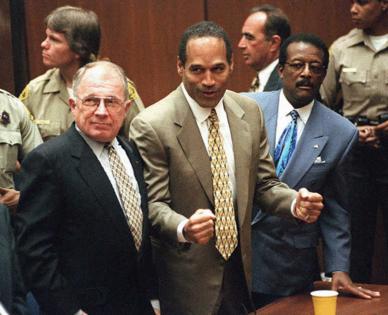Leonard Greene: OJ Simpson ex-teammate says trial showed 'Black man can buy justice like a white man'
Published in Op Eds
If there is anybody with a unique perspective on the O.J. Simpson saga, it’s Boston lawyer Eddie Jenkins.
Not only is Jenkins, a former president of the Massachusetts Black Lawyers Association, well versed on the subject of jury nullification, he had a front row seat to the vanity show as Simpson’s football teammate.
Jenkins has three things that Simpson never had: class, a commitment to the Black community and a Super Bowl ring.
Jenkins, a Brooklyn native, earned the ring as a member of the 1972 undefeated Miami Dolphins, which later traded him to the Buffalo Bills to be Simpson’s backup.
Jenkins remembers walking into his new clubhouse and seeing his own locker filled with Simpson’s stuff.
“Oh, you’re the new guy,” Simpson said before even saying hello. “You don’t mind me keeping my equipment in your locker, do you?”
It was the first of many ego displays Jenkins would witness in the short time that he knew him.
“You run during the week,” Simpson told him. “I run on the weekend.”
Jenkins, 73, said he had about 25 messages on his phone Thursday when news broke that Simpson had died at the age of 76 from prostate cancer.
But he said his first thoughts weren’t of the selfish player who took over his locker, or the teammate who turned his back on the players’ union.
“Various things went through my mind when I heard,” Jenkins told me. “I wanted to get above my own personal feelings to think about how he impacted football in general. Then I thought about how he impacted the law.”
Jenkins wasn’t part of the dream team of attorneys who earned Simpson’s acquittal in 1995.
But Jenkins has had his own stellar career as a lawyer, which included stints as a prosecutor, a defense attorney and a politician with campaigns for the City Council and district attorney in Boston.
He remains fascinated with the Simpson case.
“The O.J. Simpson trial was not a trial of O.J. Simpson alone,” Jenkins said. “It was a trial of Black America. That’s why you had so many people cheering. It showed a Black man can buy justice like a white man.”
Simpson later served nine years in a Nevada prison after being convicted in 2008 on 12 counts of armed robbery and kidnapping two sports memorabilia dealers in a Las Vegas hotel.
Jenkins says it was payback.
“They got him in Vegas for what he did in L.A.,” Jenkins said. “There’s no question in my mind. O.J. didn’t even have a gun. The other guy with him did. If you want to call one thing a jury nullification, well, so was this. This was a redux of what happened.”
Nearly 30 years have passed since the murders, but Simpson’s death brought it all rushing back in a blur: Bundy Drive, the bloody gloves, the Bronco chase, the Knicks and Houston Rockets in Game 5 of the 1994 NBA Finals.
Planted evidence. Reasonable doubt: The darkened photo of Simpson on the Time magazine cover.
In that time, I have come to the realization that O.J. Simpson was probably guilty.
I didn’t always believe that. Years ago, like many Black people, I clung to the crazy hope that somehow Simpson was the victim of a racist police culture and oppressive judicial system that was hellbent on bringing down one of the nation’s most prominent African Americans.
That wasn’t entirely untrue.
Even so, like Jenkins, I am able to separate the man from the law, and it leads me to this simple, yet troubling, conclusion:
They framed a guilty man.
___
©2024 New York Daily News. Visit at nydailynews.com. Distributed by Tribune Content Agency, LLC.







Comments